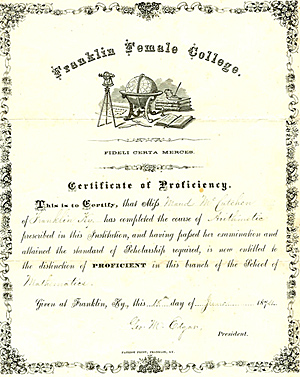In May 1868, the trustees of Franklin Female College in Simpson County, Kentucky held their first meeting. The opening agenda item–where to locate the college–would be only one of many bones of contention; even their decision to put the question to a public vote produced no clear resolution. Eventually, they acquired suitable land and erected a $20,000 building to house classrooms and boarders. The following year, male students, admitted up to that time, were officially banished from the premises.
In an arrangement common to 19th-century private schools, the trustees hired a president to oversee every aspect of the college. He would lease the property, “maintain a good first class Female School,” and admit all worthy students who applied. From the tuition he collected, he was to pay his teachers, feed his boarders, and remit an annual rent to the trustees.
What followed were decades of headaches for the trustees, as successive presidents (the first being quickly dismissed for drinking) wrestled with too many expenses and not enough income. Early in the 1880s, President H. H. Epse was scolded for not paying his teachers; after he mortgaged his belongings to secure his debt, the trustees reduced his rent owing to the severe winter that had cost him dearly in fuel and required him to refund tuition to his many sick students.
The financial burdens soon proved too much for Epse, but in 1884 the trustees were pleased with the progress of a new president. “A creation has been wrought out of chaos,” they noted upon review of the school year. Their good fortune didn’t last, but they soldiered on even after the president quit due to exhaustion and a fire destroyed the building in 1887. Only in 1917, when the Franklin Graded and High School took over the property, did the college close its doors for good.
Meanwhile, the students’ world seemed far removed from this turmoil. Maud Blair, who attended in the mid-1880s, kept an autograph book that documented the affection she and others had for the school. “The time is drawing near when our relationship as classmates must be severed,” wrote her friend Sallie regretfully; they had spent “many pleasant moments together and gained many a hard-won victory. And now, we must part; we may never meet again as pupils within the walls of the dear old College.” Another wished Maud “just clouds enough in your life to make a glorious sunset”–a blessing, perhaps, that the trustees would have felt fortunate to realize for the Franklin Female College.
Click on the links to access finding aids for collections relating to the Franklin Female College held in the Manuscripts & Folklife Archives section of WKU’s Special Collections Library. For more collections relating to schools, search TopSCHOLAR and KenCat.


